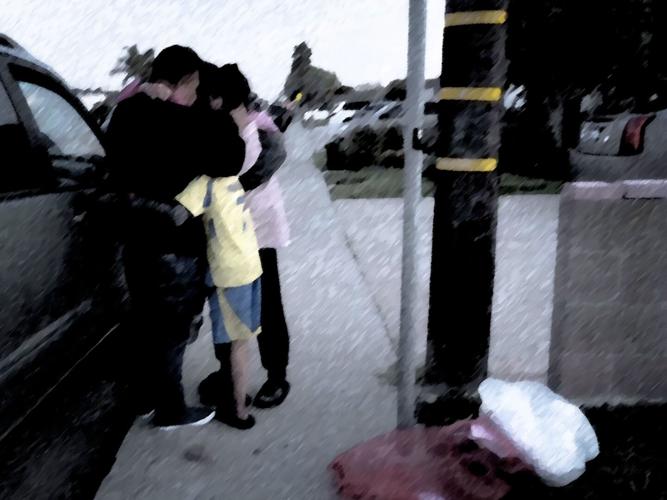
Film still. Mateo reunites with his family. (Susana Barrón)
Just as Mateo (a pseudonym used to conceal his identity), a farmworker in Oxnard, was settling into his home after being released from the High Desert Detention Center in Adelanto on a $15,000 bond, a new kind of confinement set in. His ankle monitor, part of the federal government's Intensive Supervision Appearance Program, or ISAP, wouldn't charge properly at night.
“I was terrified and replayed the same thought over and over that ICE would return, knock down my door and take me back into custody all because it wouldn’t charge," Mateo said. For many Indigenous people, like Mateo, release from detention does not mean freedom but marks the beginning of what advocates and scholars increasingly refer to as "e-carceration,," a form of digital confinement.
In addition to the GPS ankle monitor, Mateo is required to check in with the ISAP office at least four times a month. The program is run by the GEO Group, the same private company that operates detention centers and prisons nationwide. These check-ins include phone calls, video calls, home visits and office appointments. The appointments are managed through an app called BI SmartLink, which employs facial recognition and other surveillance features to monitor compliance.
Like the ankle monitor, the BI SmartLink app has been criticized for technical failures that can carry serious consequences. One app review reads, "Do they not understand if we cannot login? We are at risk of incarceration? This app needs serious attention. Constantly has errors. Today I cannot log in at all." Mateo, too, has struggled with the app, frequently unable to log in or flagged for missing a call that, he says, never came.
Mateo was among the first people detained in the first week of the Trump administration. When ICE agents approached, he was sitting in his car with his infant outside a Women, Children and Infant (WIC) nutritional store in Oxnard as his wife and daughter shopped inside. Despite campaign promises to target criminals, people with no record, like Mateo, were swept up in a broader, more aggressive wave of arrests.
"He did not have a criminal record," said Elizabeth Ramirez Barragan, Mateo's immigration attorney and a California Immigration Legal Fellow with the Mixteco/Indigena Community Organizing Project, or MICOP. Yet despite not having a record, Mateo's experience has mirrored that of individuals convicted of serious offenses. It was only about two decades ago that electronic ankle monitors like the one he now wears were used almost exclusively to track sex offenders. Electronic monitoring of migrants didn’t start until 2004.
"The children ask me about my ankle monitor," Mateo said, noting that they freeze in place and fall silent whenever the ankle monitor emits an alert. Mateo, who speaks Mixteco as his first language and only limited Spanish, often cannot understand what the alerts mean, creating a communication gap that leaves him in constant uncertainty.

Film still. Mateo’s wife holds their baby. (Susana Barrón)
Access to food also remain a challenge. During Mateo's time at the Adelanto detention facility, he lost nearly 30 pounds, often unable to stomach the meals provided, which he described as inedible. He relied on instant ramen noodles from the commissary when he had the means. That scarcity has continued at home. "Since he's been detained, we've had to cut back on our food," his wife said while breastfeeding their infant.
Mateo's wife, who once stayed home to care for their children, now works in the fields. She is currently the family's sole source of income since Mateo, who is under electronic monitoring, is unable to work. Despite the difficulties, she has continued to breastfeed their baby, though she worries the stress has affected the makeup of her milk and, in turn, the baby's health.
For more than a week, while Mateo was detained, his wife watched helplessly as their infant struggled to breathe, afraid to take her to a doctor for fear of encountering ICE. Their feeling of trepidation is not uncommon. "People are fearful," said Christine Cardona-Threadgill, Director of Programs at Friends of Fieldworkers, Inc., describing how many families now avoid medical visits out of fear that they might cross paths with ICE.

Film still. Mateo’s GPS ankle monitor. (Susana Barrón
Families like Mateo's would face a far more precarious reality without the support of community-based organizations. Friends of Fieldworkers helped the family with rent assistance, gathering donations from the outset. Pro bono legal representation during Mateo's bail hearing was provided by MICOP, while the Community Justice Exchange posted the $15,000 bond. Most recently, 805 UNDOCUFund stepped in to provide emergency funds to retain an immigration lawyer for Mateo’s upcoming court hearing.
Community-led campaigns to share Know our ights information have also proved critical. In the moments following his arrest, Mateo remembered a key lesson he had learned through social media: never sign documents under pressure from ICE. That small but powerful act of resistance, refusing to sign, may have saved him from deportation.
Mateo has also devised ways of coping with the disorienting effects of confinement. At Adelanto, where daylight was scarce and the days blurred together, he drew handmade calendars to track the passage of time. Now at home, still living under strict surveillance, he composes music to soothe the anxiety that builds within the four walls of the trailer he lives in.















(0) comments
Welcome to the discussion.
Log In
Keep it Clean. Please avoid obscene, vulgar, lewd, racist or sexually-oriented language.
PLEASE TURN OFF YOUR CAPS LOCK.
Don't Threaten. Threats of harming another person will not be tolerated.
Be Truthful. Don't knowingly lie about anyone or anything.
Be Nice. No racism, sexism or any sort of -ism that is degrading to another person.
Be Proactive. Use the 'Report' link on each comment to let us know of abusive posts.
Share with Us. We'd love to hear eyewitness accounts, the history behind an article.